Muuto’s Pebble rug has a vivid surface inspired by the feeling of walking on smooth, pebbled beach. The two-toned Pebble rug has been woven by hand from wool and jute – the woollen loops create a warm, rhythmic texture on the jute yarn. Created by the textile designer Margrethe Odgaard, Pebble rugs will easily suit both homes and public surroundings.
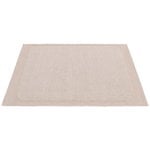
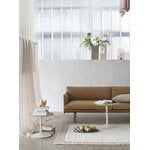
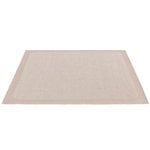
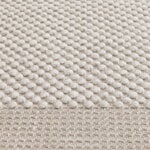
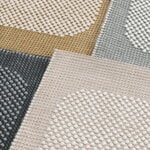
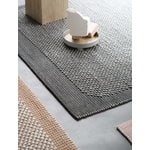
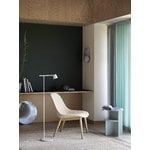

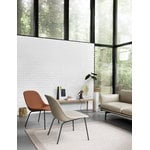
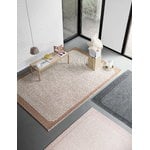
Pebble rug, pale rose
Muuto
Description
Muuto’s Pebble rug has a vivid surface inspired by the feeling of walking on smooth, pebbled beach. The two-toned Pebble rug has been woven by hand from wool and jute – the woollen loops create a warm, rhythmic texture on the jute yarn. Created by the textile designer Margrethe Odgaard, Pebble rugs will easily suit both homes and public surroundings.
Product details (5)
- Material
- 60% New Zealand wool, 40% jute, canvas backing pasted with synthetic latex
- Colour
- Pale rose
- Length
- 240–300 cm
- Width
- 170–200 cm
- Care instructions
- Gentle vacuum cleaning, professional dry cleaning. Avoid cleaning with water, as this will damage the product.
- Product ID
Designer
Margrethe Odgaard (b. 1978) is an award-winning Danish textile designer who strives to find new applications for colours and patterns. She graduated from The Royal Danish Academy of Fine Arts in 2005 having first studied fashion design and then majored in textile design. Before founding her own studio in 2013, Odgaard worked for The Fabric Workshop and Museum in Philadelphia and the French fashion brand EPICE.
Odgaard has designed both textiles and furniture for a number of well-known Nordic brands such as Muuto, Skagerak, Hay, IKEA and Georg Jensen. She also works together with designer Chris L. Halstrøm under the name Included Middle, and in 2016 their Vivlio shelving system won the Red Dot Award. In the same year, Odgaard received the Torsten and Wanja Söderberg Prize, which is the world’s largest annual design award.
View all productsReviews (0)
Sustainability
The Product Sustainability Framework, our criteria of sustainable design, helps you find the most sustainable products in our selection. Read below which sustainability criteria this product has met.
Working conditions & labour 7/9
-
Equal opportunities for all employees
-
Commitment to UN Global Compact, fair compensation for all employees
-
Corporate responsibility requirements defined and communicated for suppliers
-
Systematic work for improved inclusion and well-being in the workplace
-
Transparent supply chain
-
Suppliers' compliance to a code of conduct ensured
-
Compliance to the UN Guiding Principles on Business and Human Rights ensured in the supply chain
-
Direct suppliers audited and certified
-
Support for community involvement in the supply chain
Eco-friendly production 9/9
-
Fair and resource-wise water-use in production
-
No incineration or landfilling of returned items
-
No use of endangered species as materials
-
No direct environmental emissions or waste (excl. GHGs) from production
-
The sustainability of direct suppliers' production is addressed and monitored
-
Production and material sourcing that respect biodiversity, animal rights, and natural ecosystems
-
Material-efficient and ecological packaging
-
Positive impact on nature’s well-being through operations that regenerate natural ecosystems
-
No potentially harmful chemicals used in own production
Climate impact 4/8
-
Company's direct greenhouse gas emissions identified and commitment to reduction
-
Product's carbon impact identified and commitment to reduction
-
Guidance on energy- and eco-efficient use of the product
-
Contribution to climate initiatives beyond the brand’s direct operations
-
Low-carbon or compensated transportation
-
Carbon footprint of the product calculated and goals set to reduce it
-
100 % renewable energy in own production and operations
-
Carbon neutral or carbon negative product
Sustainable materials 3/6
-
Sustainable and long-lasting material choices
-
No harmful or hazardous substances
-
Responsible raw material sourcing and production
-
Materials suited for circularity: monomaterials, recyclable finishings, renewable or recycled contents etc.
-
Ecological materials: natural, biodegradable, recyclable or recycled contents
-
Outstanding materials in terms of innovativeness, responsibility, sustainability and circularity: local production or sourcing, 100 % recycled content, C2C-certification etc.
Circular design 4/5
-
High aesthetic quality promoting long-term use of the product
-
Technically durable product design and material choices
-
Design for enduring life-long quality
-
Design and support for product maintenance, repair and upgradability
-
Innovative circular design solutions: circular service system, resale platform, remanufacturing, collection of used products, etc.













